How many of us have slapped our name on a CD of our songs and hoped that the world would be entranced by our lovely voice, our delightful acoustic picking, and the beauty or life-changing profundity of our lyrics? Lots of us. I did it several times. The world was not entranced, though frankly I fancy I was not half bad at the singer-songwriter thing.
I tell you this not to whinge, not really, but to point out that thousands upon thousands have tried this. Some end up the object of adulation to a large group of fans. Some get a cult audience. Some vanish without a trace.
I happily leave the digging up of singer-songwriter obscurities to obsessive freak-folkers, but once you’ve unearthed ’em I’m happy to pronounce on their quality. Actually, while some of the following fit that description well, some are, I admit, by quite well-known people. The reason I call them “overlooked” is that maybe these albums aren’t well known to any except rabid fans (like, say, of Graham Nash with CSNY), but in my opinion these records are better than a lot released by far more famous singers. For instance, Nash’s album is easily as good as any CSNY album and as good as Neil Young’s best work. Also, each of these records beats anything by Cat Stevens or Harry Chapin, I can tell you that with dead certainty. Give this stuff a listen.
 Ralph McTell – Not Till Tomorrow (1972)
Ralph McTell – Not Till Tomorrow (1972)
McTell’s body of work tends to be somewhat neglected when we talk about great s/sw’s, which is odd. Sure, “Streets of London” was a big hit (and a hell of a song), and it’s true that an occasional maudlin nature has crept into McTell’s work, but he is in fact one of the UK’s greatest songwriters (he wrote some great tunes for Fairport Convention and his recent work is stellar), and this early Tony Visconti-produced effort is ample evidence of that. An intelligent, literate songwriter, and an amazing acoustic fingerstyle ragtime-inspired player, McTell puts his whole palette on display here, from passionate folk-pop (“Zimmerman Blues”, “That Time of the Night”) to gentle psych-folk (the lovely “Barges”, “Nettle Wine” and “Another Rain Has Fallen”) to tender ballads ( the piano ballad “Sylvia”, written for Sylvia Plath, and “First Song”). There’s energetic guitar workouts like “Birdman” and even an album-concluding epic, “Gypsy”, probably the first song to deal sympathetically with the oppression of the Roma people (which is still very much ongoing), featuring some great Eastern note choices and a full-on staged whistle-and-clap Roma party in the outro. All of this is anchored by McTell’s unassuming baritone. A really, really good album.
Highlight tracks: “Barges” and “Gypsy”
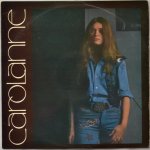 Carolanne Pegg – Carolanne (1973)
Carolanne Pegg – Carolanne (1973)
Pegg was one of the brains behind weird Yorkshire electric folk band Mr. Fox, which made two rather odd, creaky-sounding albums of spooky music. Carole Pegg (+added anne) released this equally interesting solo album, presumably in a gambit to join Sandy Denny at the top of the British folk s/sw heap. I guess it didn’t work, but what an interesting relic it is. Steeleye Span singer Maddy Prior is known for the witchy, dramatic nasality of her delivery (this is a compliment). Well, Pegg outdoes her, cackling and shrilling and trilling. It’s kind of the anti-Enya, to put it in perspective. You can picture Pegg dementedly crooning these tunes to the clouds from the doorway of her wattle hut on the moors. The material is a mixture of sort-of contemporary-sounding tunes, played fairly blandly but classily by a band, and much more interesting traditional-style story songs where Pegg can really stretch out in her storytelling. Hence, numbers like “Fair Fortune’s Star” and “Lady and the Well” will be of most interest to listeners, I imagine. “Winter People”, the closing track, is also interesting. Pegg not only had a distinctive voice but also some very unusual lyrics, so it’s a bit of a shame that her talent wasn’t further developed over subsequent albums.
Highlight tracks: “Lady and the Well” and “Fair Fortune’s Star”
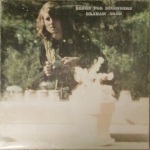 Graham Nash – Songs for Beginners (1971)
Graham Nash – Songs for Beginners (1971)
So I hear you go, what? How could that dancin’ hippie Nash, of one of the biggest bands of the seventies, not to mention one of the most influential, have an overlooked album? Because he does. As I said, I can’t think of a Young or Stills album that beats this for sheer quality. I don’t love all the songs, but I love most of them very much. I used to think Nash was the fluffy filler of the band, the happy dude without much depth. Well, that was wrong. The songs here are either really groovy or delicate and genuinely beautiful. All are well-arranged, usually sparsely. “I Used to be a King” just has this majestic, sky-high sway to it (psychedelic pedal steel, man), as well as that stormin’ double-time chorus where his voice just soars. “Military Madness” and “Chicago” (Yep, about that nasty time in Chicago) show an aptitude for both anger and analysis of the foibles of the twentieth century. But then there are subtle, personal songs like the fragile “Sleep Song” and “Wounded Bird”, in which Nash shows both compassion and a wisdom beyond his years at the time. The lyrics on the whole are surprisingly incisive on this album. Listen to the samples and you’ll hear exactly what I mean.
Highlight tracks: “I Used to Be a King” and “Military Madness”
 Shelagh McDonald – Stargazer (1971)
Shelagh McDonald – Stargazer (1971)
Long-lost Scottish songstress McDonald’s work was discovered a while back, and unfortunately she was not around to enjoy the attention — she disappeared, somewhat mysteriously. Turns out to have been a sadly typical case of post-sixties burn-out. This album has its fans, but it’s nothing like the level of admiration directed at freak-folk idols Vashti Bunyan and Linda Perhacs, which is weird considering how accomplished this timeless album is. McDonald’s vocal style was equal parts Sandy Denny and (pre-smoking voice) Joni Mitchell, and what a lovely style it is. It’s surprising this didn’t do better at the time. There’s of course a strong folk vibe to the proceedings as well as the whiff of hippiedom, but the production is quite polished. The hyper-dramatic title track, featuring elegant strings, is just totally beautiful, as is the piano ballad “Lonely King”, but the highlight for me is the space-rock grooviness and gang-vocal chorus of of “Odyssey”, which I think you will agree is a truly great example of psych and folk fusion. These three songs alone are easily on a par with Sandy Denny’s best, and though McDonald’s work really can’t escape that comparison, by no means is she diminished by it. She has now resurfaced and I have read that she is considering new music-making, which is wonderful news.
Highlight tracks: “Odyssey” and “Stargazer”
Harper is well-known enough, mainly thanks to his relationship with Jimmy Page (and having a Zep song named after him), but this acid-tongued acid folkie has been putting out gems of albums since late 1960s. This is perhaps his best-known album (perhaps) but I bet many of you haven’t heard it before. By the early seventies Harper’s style had evolved into what could perhaps best be described as progressive folk — long, meandering, spacy songs that sure take their time getting where they’re going, delivered with characteristic cheeky intensity. There are only four songs on this album! And acoustic guitar is basically all there is on this album aside from a few touches like the horns on “Me and My Woman”. Despite that, the four-track Stormcock has a wonderfully hypnotic mood and some excellent melodic moments. You don’t even notice, as the songs wend their way on their hallucinogenic paths, that there are so few pieces on the record, since album feels like a complete listening experience. “One Man Rock and Roll Band” is particularly psychedelic, but each of these four tracks is a gem.
Highlight tracks: “Me and My Woman” and “Hors D’Oeuvres”
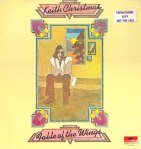 Keith Christmas – Fable of the Wings (1970)
Keith Christmas – Fable of the Wings (1970)
Who? Well, this English fella Christmas actually made several albums in the early seventies that are quite good, ranging in style from the sort of gentle, pastoral hippie folk one would expect of the times to upbeat funky early seventies rock of the style that Tim Buckley would eventually adopt (though Christmas wasn’t as … aggressive in his approach as sexy Timmy). Anyway, this is very much psychedelic folk-rock rendered in Christmas’s reasonably good tenor, finding Christmas joined by some musicians associated with the Richard Thompson/Fairport family. There are quite a lot of groovy moments; he’s also a pretty darn fine fingerpicker, though the unaccompanied songs like “Fable of the Wings” and “The Fawn” (backing vocals by Shelagh McDonald) are not as interesting as the groovier numbers like the lengthy “Lorri” with its psychedelic organ, the trad-music-style ballad “Kent Lullaby” or the elegant “Hamlin”, which is accompanied by flute mellotron and features a very interesting guitar solo sound (if Fleet Foxes made this song, it would be a current indie sensation). While this is not a special album by any means, its quality really demonstrates the depth of the English music scene at that time.
Highlight tracks: “Lorri” and “The Fawn”
 Ian Matthews – Tigers Will Survive (1972)
Ian Matthews – Tigers Will Survive (1972)
Matthews (sometimes Iain) has had a long career and made, well, a LOT of albums, without ever really breaking through and getting his due success, aside from with aficionados. Best-known as Fairport Convention’s late-sixties vocalist, he left that group to pursue a more American style. In many ways, he’s one of the grandpappies of alternative country, considering his classy catalogue of immaculately arranged roots rock that never got too edgy but is always smart, emotionally and melodically satisfying. And his voice, well, it’s one of the smoothest in music history, soothing but expressive. This is one Matthews’ finest albums, a varied collection of very strong songs, including the energetic folk-pop of the title track (which features an odd, slowed down and kinda stoned mid-section) and “Never Again”, a super-fun a cappella arrangement of “Doo Ron Ron” and other unassuming gems like “Please Be My Friend” and the groovy “Right Before My Eyes”. Richard Thompson is among the stellar backing musicians. This stuff doesn’t blow your mind, it’s more like watching a nice slow sunset.
Highlight tracks: “Please Be My Friend” and “Never Again”
 Bridget St. John – Ask Me No Questions (1969)
Bridget St. John – Ask Me No Questions (1969)
St. John was a hippie folk favourite around the turn of the seventies, a mainstay of that scene in the UK, but sadly, her fame did not carry forward. Some, though, consider her sort of a female Nick Drake. This comparison is not really all that apt. Sure, her stuff is pastoral in tone, and she has a rather low, husky voice for a lady, but her gentle songs are generally quite upbeat and inspiring rather than melancholy. Like Drake, she also played her acoustic rather well, and this sparsely arranged album really needs little more than St. John’s voice and guitar to carry it. Such lovely tunes as “Autumn Lullaby” and “I Like to Be With You in the Sun” are easily as good as the much more heralded (now, at least) Bunyan’s output — some really beautiful gentle psych-folk. This sort of stuff is dated, but in a good way. It’s a trip back to a London park, sitting on the grass in your caftan without a care, singing to birds n’ the bees in a spirit of optimism. If you like the kind of acoustic album that puts you in a happy wee trance, this one will do it.
Highlight tracks: “Curious Crystals of Unusual Purity” and “I Like to Be With You in the Sun”
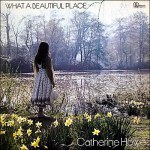 Catherine Howe – What a Beautiful Place (1971)
Catherine Howe – What a Beautiful Place (1971)
Howe is yet another British lady singer who put out a great album but it didn’t carry forward to mass success. Mind you, Howe did go on to record more albums and have a pretty solid career, but I also don’t think nearly enough people have heard this totally magical debut album. Talk about a mood! Howe’s songs are mega-arranged for the full-on cheese orchestra of strings, horns, jazzy piano, you name it, in full, lush arrangements. This could have backfired in a schmaltzy way, but instead it sets a misty, ethereal, contented mood. Lovers of Sandy Denny’s equally lush Like an Old-Fashioned Waltz will know exactly what I mean here. This music is the kind you throw on the turntable on a sunny spring afternoon and just happily drift away on those sweeping strings and Howe’s soothing voice. Such songs as “On a Misty Morning”, “It’s Not Likely” and the transcendent “In the Hot Summer” should be considered prototypes for how you make classy adult jazz-folk. If you want another reference, the nice arrangements on Elton John’s early albums are another parallel.
Highlight tracks: “Up North” and “It’s Not Likely”
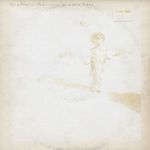 Dory Previn – Reflections in a Mud Puddle (1971)
Dory Previn – Reflections in a Mud Puddle (1971)
A rather tragic figure in many ways, Previn was a skilled songwriter who ended up married to Andre Previn, the conductor. Then lost him to Mia Farrow. Who later lost a husband to his own sort-of daughter. Gross. Which is EXACTLY the sort of weirdness that only Dory could really have captured in a lyric. This collection of seemingly run-of-the-mill tunes (instrumentally the blandness could be from a Nilsson or Chapin album) delivered matter-of-factly by Dory gets a ton more interesting when you pay attention to the lyrics. For this is as sharp a pen as ever wrote a set of lyrics. Pulling no punches, she had no problem dissecting her own personality and her family history (side two is “a personal account of the deterioration of their relationship and her anguish at their differences remaining unresolved at the time of her father’s death”), but also specialized in gutting social mores and exposing life’s little hypocrisies with a few choice words. Just check out the nastiness of “The Altruist and the Needy Case” (“He’s at home among the homeless/singing set my people free/He will march with total strangers/But he will not walk with me”). Not only is that sort of soul-baring rare, it was particularly rare in female singers at that time (Mitchell’s confessionals on Blue passing for edgy), but Dory obviously didn’t give no f*cks, and her satire is both disturbing and delicious — on each of her few albums.
Highlight tracks: “The Altruist and the Needy Case” and “Doppelganger“

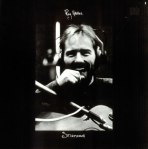
An excellent set of suggestions here. I must admit, I never got Andre’s missus and there are a few that passed me by (Blimey!). Love McTell, Harper and St John but have other personal favourites. I prefer Ian Matthew’s “If You Saw Thru’ My Eyes” for the sheer majesty of Messrs Thompson, Renwick and Robert’s guitar work alone – especially “Reno Nevada” and “Morgan the Pirate”. And I prefer Cat Steven’s “Mona Bone Jakon” to a few others here. Each to his own, of course.
Out of interest, Richard Thompson played on “Stargazer” – I’m damned if I can spot it! Must have been an acoustic session.
Another great selection here.
LikeLike
I have to admit, Cat just bugs me. So darn cheery and optimistic! The same effect James Taylor has on me. But yeah, we each have our own personal likings!
LikeLike
Love Bridget St. John
LikeLike
:>
LikeLike
So pleased to see Ralph McTell’s ‘Not Till Tomorrow’ on here. An overlooked classic, in my view. Bought it in 1972. It looked like Warner Brothers were really going to work to promote him but it sort of fizzled out – largely down to Ralph himself, I think. One of the things I like about Ralph is that he’s just had a great life for himself as a musician without droning on about how ‘hard’ it is. He just gets on with it. Always has.
LikeLike
It’s been a favourite of mine since my teens. McTell hasn’t gotten enough good press, at least outside of the UK, but he’s a legendary talent.
LikeLike